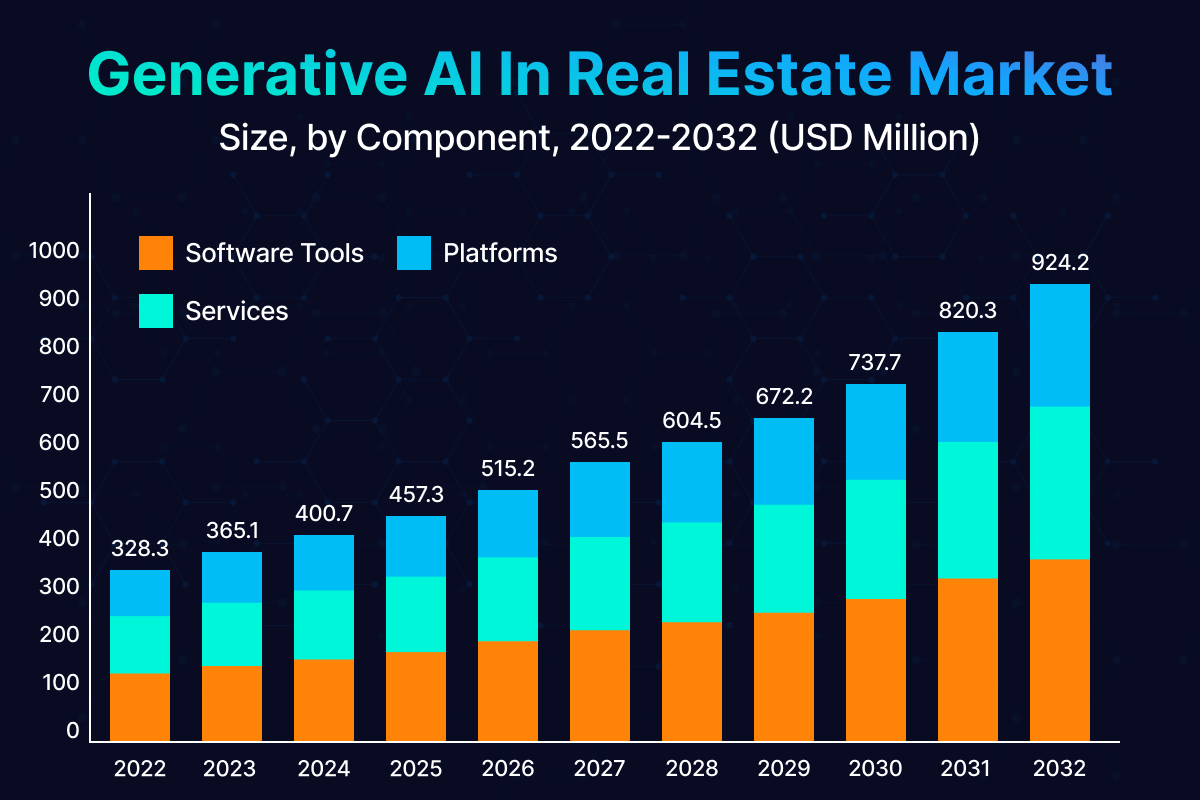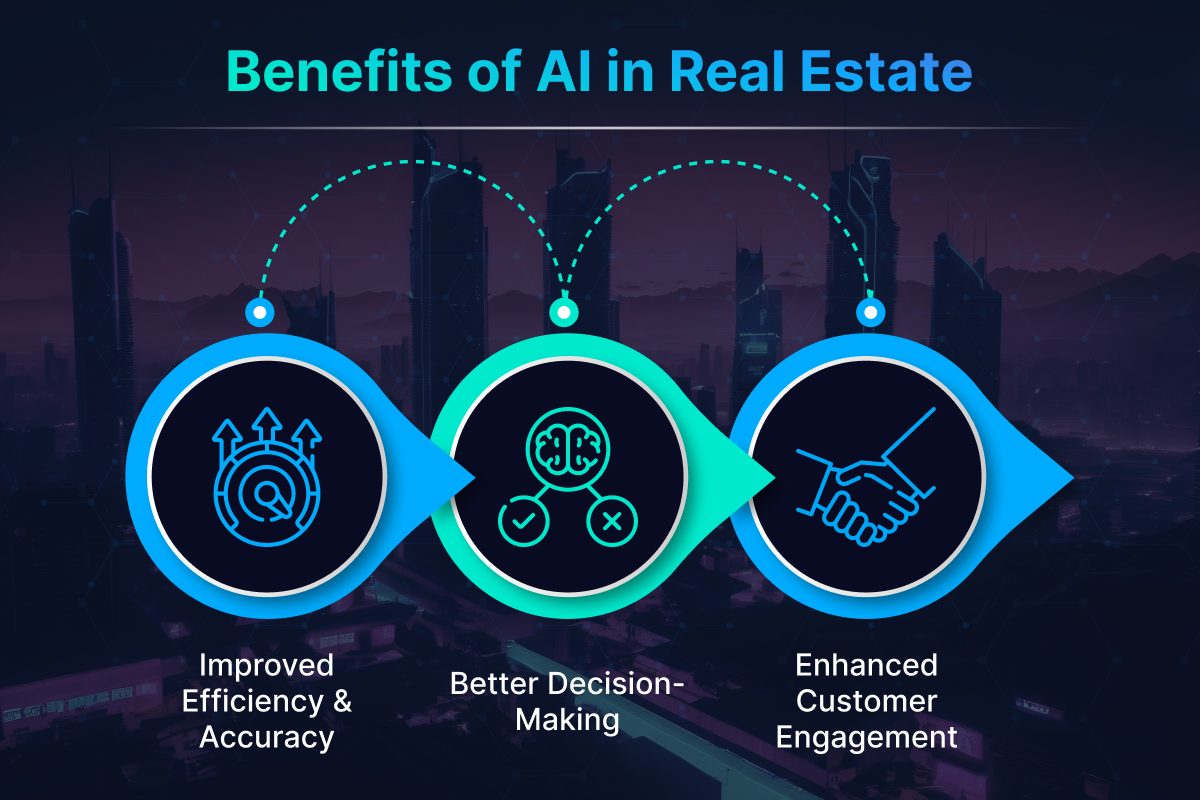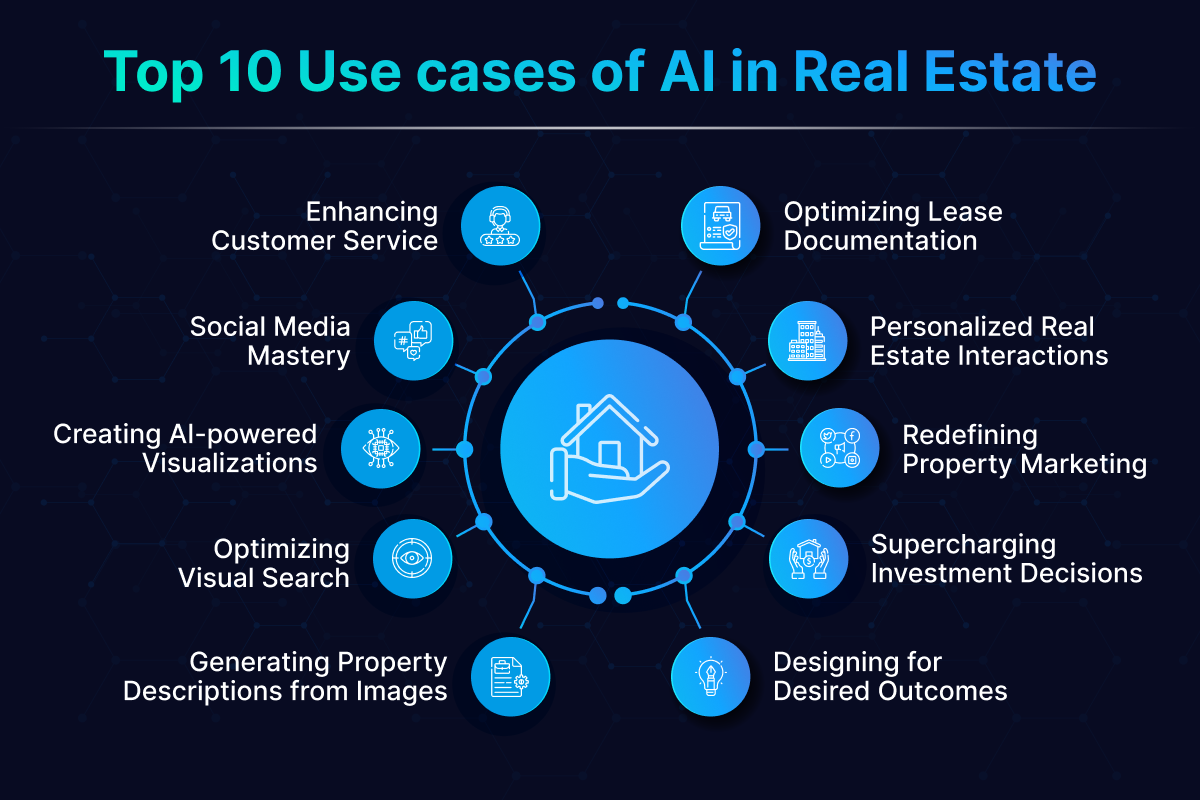Impact of Generative AI in Real Estate Industry
-min.png)
The real estate industry, traditionally known for its cautious approach to innovation, is on the cusp of transformation. This shift is driven by the rise of Generative AI – a powerful technology capable of creating entirely original content from existing data.
It is a known fact that real estate investors stockpile vast troves of data, which includes property details, tenant demographics, market trends, etc. Generative AI in real estate can make the most of this information, thereby facilitating the creation of customized tools specifically tailored to real estate needs. There are numerous possibilities within the vast spectrum of generative AI applications that can open up entirely new streams of revenue. A few of these include lightning-fast opportunity identification for investors, revolutionary design tools for buildings and interiors, and dynamic marketing materials that personalize the customer journey.
For decades, analytical AI has quietly revolutionized numerous industries. From AI-driven investment strategies to dynamic pricing models, its impact is undeniable. However, real estate, burdened by its historical reluctance to embrace new technologies, has largely remained on the sidelines. Gen AI presents a golden opportunity to break free from this inertia and help the industry become a leader in technological innovation
Experts at the McKinsey Global Institute estimate that gen AI has the potential to generate a staggering $110 billion to $180 billion in value for the real estate sector. Despite the immense potential, many organizations struggle to translate this technology into tangible benefits. Implementing and scaling gen AI solutions effectively requires a strategic approach.
 In this piece, we’ll explore the exciting possibilities of generative AI, showcasing real-world use cases currently being explored by industry players, along with several crucial steps companies can take to take maximum advantage of this technology.
In this piece, we’ll explore the exciting possibilities of generative AI, showcasing real-world use cases currently being explored by industry players, along with several crucial steps companies can take to take maximum advantage of this technology.
How Generative AI is Changing Real Estate
The real estate industry thrives on effective communication and creative presentation. But let's face it, generating fresh content for every property and client interaction can be a time-consuming challenge. Here's where generative AI (gen AI) steps in, offering a powerful tool to optimize your workflow and boost your creative edge.
Generative AI can act as an intelligent assistant specifically designed for your real estate business. It can analyze vast amounts of data, understand complex trends, and even generate creative text formats. This translates to real benefits for busy professionals
- Generative AI services can help automate repetitive tasks like generative data-driven reports or crafting initial property descriptions. This frees up valuable time for you to focus on higher-level strategies and personalized client interactions.
- Gen AI can analyze successful marketing campaigns and user preferences to inform your creative direction. It can help you brainstorm new ideas for property presentations and marketing materials.
- Gen AI excels at analyzing complex data sets, discovering hidden insights, and identifying potential opportunities. This allows you to make data-driven decisions that optimize your listings, target the right audience, and ultimately close deals faster.
Real-World Use Cases of Generative AI in Real Estate
Generative AI goes above and beyond data analysis. It can help real estate professionals/businesses create more efficient operating models, stronger customer experience, new revenue streams, and smarter asset selection. As a result, real estate companies gain over 10 percent or more in net operating income; as suggested by factual observations. Essentially, generative AI can strengthen customer engagement, content creation, and data concision, bolstering the operations of real estate businesses.
Below are a few of the most prominent use cases of generative AI in real estate.
Optimizing Lease Documentation
Sifting through heaps of lease agreements can be a laborious and error-prone task. Generative AI can automate the extraction and analysis of key data points from lease documents. It can extract critical information like lease terms, rent escalations, and maintenance responsibilities, saving countless hours and minimizing the risk of human error. This allows real estate professionals to focus on strategic analysis and client relationship building.
Personalized Real Estate Interactions
The human touch remains crucial in real estate and generative AI can enhance every interaction. For instance, Generative AI chatbots, trained on vast datasets, can answer client inquiries 24/7 with personalized insights. This frees up valuable time for real estate agents to focus on complex negotiations or in-person consultations. Additionally, gen AI can analyze client behavior and preferences, allowing agents to tailor their communication and recommendations, fostering stronger relationships and a more satisfying client experience.
Redefining Property Marketing
Traditionally, property marketing relied on static photos and descriptions. Generative AI opens up a new era of visualization. It can facilitate immersive virtual tours, even for properties under construction. Potential buyers can explore layouts in 3D, visualize design options with different finishes and furnishings, and get a true feel for the space from anywhere in the world. This nurtures deeper engagement and allows buyers to make informed decisions before scheduling physical viewings. Furthermore, generative AI can create high-quality property descriptions from existing images, automatically highlighting key features and amenities. This eliminates the need for manual content creation and ensures consistency across marketing materials.
Supercharging Investment Decisions
Real estate investment involves analyzing vast amounts of data to identify lucrative opportunities. Generative AI helps investors to leverage this data in powerful new ways. AI models can analyze market trends, demographic shifts, and property valuations to predict future rental yields and investment returns. This allows investors to make faster, more precise decisions and gain a competitive edge in the market.
Designing for Desired Outcomes
The design phase of a real estate project is crucial. Gen AI can assist architects and developers in creating spaces that cater to specific needs and demographics. AI models trained on data sets of successful buildings can generate architectural plans known to achieve desired outcomes. This could involve maximizing energy efficiency, optimizing layouts for specific tenant types, or even predicting resident satisfaction based on design elements. Generative AI aids architects to move beyond traditional design methods and explore innovative possibilities for the future.
Generating Property Descriptions from Images
Generative AI can aid real estate ventures in crafting compelling property descriptions. It can analyze photos and data to generate rich, informative text. AI systems can automatically create descriptions that capture the essence of a property, highlighting key features like hardwood floors, modern appliances, or stunning views. This saves the valuable time of the realtors as well as ensures consistent and engaging property descriptions across listings. Additionally, generative AI can localize descriptions for foreign markets, expanding the reach of properties and attracting a wider pool of potential buyers.
Optimizing Visual Search
Finding the right keywords for visual search can be a challenge in the real estate industry, especially when discoverability is crucial. Generative AI analyzes property images and generates relevant keywords that accurately reflect the property's unique features. This ensures listings appear in searches for terms like "spacious backyard" or "modern kitchen," driving more qualified leads toward the property. By optimizing visual search, generative AI helps real estate agents connect with potential buyers actively seeking properties with specific features.
Creating AI-powered Visualizations
While virtual tours offer a glimpse into a property, generative AI can create even more immersive visualizations. It can generate photorealistic images or even short videos showcasing a property's potential. This could involve virtually staging empty spaces with furniture and décor, allowing buyers to envision themselves living in the space. Additionally, generative AI can create visualizations of future development projects, helping potential buyers understand the overall vision and feel of the completed space. These AI-powered visualizations go beyond static photos, whetting the appetite of potential buyers.
Social Media Mastery
Social media is a powerful marketing tool in real estate, but creating consistent and engaging content can be time-consuming. Generative AI offers a solution. It can generate social media posts customized to specific properties and target audiences. This could involve creating catchy captions highlighting unique features, or crafting location-specific posts that resonate with local demographics. By automating content creation, generative AI allows real estate professionals to maintain an active social media presence without sacrificing time or creativity.
Enhancing Customer Service
The real estate journey can be complex and filled with questions. Generative AI can act as a virtual concierge, providing 24/7 customer support. AI-powered chatbots trained on vast datasets can field inquiries about properties, schedule appointments, or even provide basic legal information. This not only improves customer satisfaction by offering round-the-clock support but also allows real estate professionals to dedicate their time to more complex client needs. By optimizing the customer experience, generative AI promotes trust and builds stronger relationships between real estate agents and their clients.
A Guide to Implementing Generative AI in Real Estate
Generative AI presents a golden opportunity for real estate companies to revolutionize their operations and gain a significant edge. However, realizing its full potential requires a strategic roadmap. Here are seven crucial steps to best implement generative AI in real estate.
Executive Alignment & Business-Driven Roadmap
The journey begins with leadership. Secure buy-in from your C-suite by establishing a clear business roadmap that integrates gen AI into a specific area of your real estate value chain. Whether it's optimizing marketing efforts, realigning investment decisions, or enhancing the customer experience, focusing on a targeted goal ensures resources are allocated effectively. It is constructive to create a roadmap that outlines how generative AI will transform property leasing, for example, by automating lease agreement generation or creating AI-powered chatbots to answer tenant inquiries 24/7. This targeted approach demonstrates the tangible value proposition of gen AI and nurtures leadership support.
Data is the Fuel
Generative AI thrives on high-quality data, the fuel that powers its insights and creativity. Focus on fortifying your data infrastructure, particularly new proprietary data sources unique to your company. This could include tenant feedback gathered through surveys, property usage patterns gleaned from smart building technology, or local market trends derived from social media analysis. The richer and more diverse your data, the more powerful and insightful your generative AI applications will be.
Building a Real Estate-Specific "Prompt Library"
Effective communication is vital for tapping into generative AI’s true potential. Prompts act as instructions that guide AI models. Invest in creating a library of prompts specifically customized to the real estate industry. These prompts will ensure generative AI models generate the most relevant and actionable outputs that align with real-world real estate scenarios. For instance, a prompt might instruct a generative AI model to "create a property description for a two-bedroom apartment, highlighting the spacious living area and proximity to top-rated schools." By developing a robust library of real estate-specific prompts, you ensure your applications deliver valuable and actionable results.
Actionable Insights, Not Just Information Overload
Gen AI shouldn't simply generate reports; it should empower action. Focus on developing digital tools that translate insights into actionable steps. This could involve AI-powered recommendations for property pricing strategies based on market trends, virtual assistants that guide potential buyers through the sales process by answering questions and scheduling tours, or automated lease agreement generation based on specific criteria set by your leasing team. For example, an AI-powered tool can analyze rental data and suggest optimal pricing strategies for different property types, maximizing your return on investment.
Modernizing Your Tech Stack
To utilize gen AI effectively, your company needs a modern technology stack that facilitates seamless data flow and integration with AI models. Invest in infrastructure that can handle large datasets and support the computational demands of generative AI applications. This might involve upgrading data storage solutions, adopting cloud-based computing platforms, or implementing new data management tools. A modern tech stack ensures your organization can take maximum advantage of generative AI without technical roadblocks.
Scalability for Growth
As your real estate portfolio expands and diversifies, your generative AI strategy needs to adapt. Develop an operating model that can scale alongside your business. This includes building a team with the expertise to manage and maintain AI models, as well as establishing processes for continuous improvement and adaptation of your gen AI strategy. Consider forming a team of data scientists and real estate professionals working collaboratively to refine generative AI models and ensure they remain effective as your business grows and your needs evolve.
Mitigating Real Estate-Specific Risks
While gen AI offers tremendous potential, it’s crucial to acknowledge and mitigate risks specific to the real estate industry. This might involve bias detection and mitigation within AI models to ensure fair and ethical treatment of all stakeholders, implementing robust data security and privacy measures to comply with regulations, or establishing clear ethical guidelines for deployment across your organization. By proactively addressing these risks, you can ensure your company leverages generative AI responsibly and ethically.
The Future of Generative AI in Real Estate
Generative AI's impact on real estate is only just beginning. As the technology matures, we can expect even more transformative applications to emerge. Here's a glimpse into the exciting possibilities that lie ahead.
Hyper-Automation
Repetitive tasks will become a thing of the past. Generative AI will automate processes like lease agreement generation, property valuation analysis, and even tenant screening, freeing up real estate professionals to focus on strategic initiatives and building relationships.
Personalization at Scale
The future of real estate is about delivering a truly personalized experience for every client. Generative AI will analyze vast amounts of data on buyer and tenant preferences to create customized marketing campaigns and property recommendations, and even generate personalized virtual tours that showcase potential properties based on individual needs.
Beyond Human Capabilities
AI models trained on massive datasets can identify hidden patterns and trends that might escape even the most experienced real estate professional. This can lead to more informed investment decisions, optimized property development plans, and a deeper understanding of market dynamics.
Seize the Generative AI Advantage
The real estate industry stands at a crossroads. Generative AI presents an incredible opportunity to gain a significant competitive edge. By adopting generative AI and implementing the strategies outlined above, real estate companies can create a future of enhanced efficiency, personalized client experiences, and data-driven decision-making
At Webclues Infotech, as a generative AI development company, we are one of the frontrunners in AI and real estate technology. Our team of experts is dedicated to developing innovative solutions that harness the power of generative AI. Whether you're looking for AI-powered property marketing tools, data-driven investment analysis solutions, or assistance in building your gen AI roadmap, we can help.
We are committed to providing real estate professionals with the tools and knowledge they need to thrive in the age of generative AI. Contact us today to learn how we can help your company tap into the transformative potential of this incredible technology.
Build Your Agile Team
Hire Skilled Developer From Us
Reinvent your real-estate business with generative AI integration
Generative AI is transforming all major industries and real estate is no exception. We at Webclues are a trusted name in providing cutting-edge generative AI solutions. Connect today to integrate gen AI in your real estate venture.
Get a Quote!Our Recent Blogs
Sharing knowledge helps us grow, stay motivated and stay on-track with frontier technological and design concepts. Developers and business innovators, customers and employees - our events are all about you.
Contact
Information
India
Ahmedabad
1007-1010, Signature-1,
S.G.Highway, Makarba,
Ahmedabad, Gujarat - 380051
Rajkot
1308 - The Spire, 150 Feet Ring Rd,
Manharpura 1, Madhapar,
Rajkot, Gujarat - 360007
UAE
Dubai
Dubai Silicon Oasis, DDP,
Building A1, Dubai, UAE
USA
Atlanta
6851 Roswell Rd 2nd Floor,
Atlanta, GA, USA 30328
New Jersey
513 Baldwin Ave, Jersey City,
NJ 07306, USA
California
4701 Patrick Henry Dr. Building
26 Santa Clara, California 95054
Australia
Queensland
120 Highgate Street,
Coopers Plains,
Brisbane, Queensland 4108
UK
London
85 Great Portland Street, First
Floor, London, W1W 7LT
Canada
Burlington
5096 South Service Rd,
ON Burlington, L7l 4X4
Let’s Transform Your Idea into
Reality. Get in Touch





